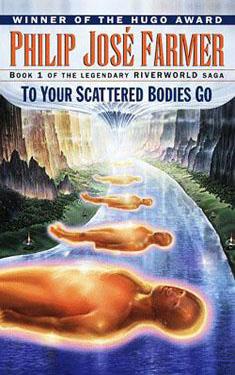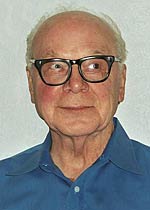GMRC Review: To Your Scattered Bodies Go by Philip José Farmer
 Jeremy Frantz (jfrantz) reviews SF/F books on his blog The Hugo Endurance Project where he has given himself just 64 weeks to read every Hugo Award winner. This is his sixth GMRC review to feature in the blog.
Jeremy Frantz (jfrantz) reviews SF/F books on his blog The Hugo Endurance Project where he has given himself just 64 weeks to read every Hugo Award winner. This is his sixth GMRC review to feature in the blog.
Sir Richard Francis Burton died in 1890. He was resurrected along with every other human being that ever lived, hairless and naked in a vast river valley on an unknown planet in an unknown time. Burton eventually bands with an unlikely group which includes a prehistoric Neanderthal, an adolescent girl, an alien from Tau Ceti and a number of others from varying places and times. Armed each with a towel and “grail” (I pictured a metal trash can that provides food and supplies when placed under a mushroom shaped “grailstone”), the group sets out to find out what exactly is going on.
Strange fruit
The best way I can describe this first installment in Philip José Farmer’s Riverworld Saga is to say that it is ripe. With people from all times and places resurrected in one place, an epic river adventure, mass promiscuity and some gratuitous violence, what could possibly be off limits? Within just four short chapters of beginning this book, the juice of possibility was dripping down my arm like an over-ripe peach.
Leaning heavily on all that is possible, the story eventually develops a good head of steam which culminates in a river battle with a group of slaveholders led by none other than Herman Göring. To that point, there had been something Zelazny-esque about the journey that despite little more than a vague conception of the goal or possible outcome, nonetheless moves forward determinedly and is punctuated by alternating periods of despairing self-examination and then of ultra-violence.
Like Zelazny’s Hugo winners, the more that is uncovered along the way, the more questions readers are left with, which creates a kind of slow building and eventually snowballing tension that could have no other outlet than a violence that would have you convinced that real people fought and died. The river battle with Göring’s minions is sweaty, bloody, disturbing and represented the high-point in the book for me.
GMRC Review: To Your Scattered Bodies Go by Philip José Farmer
 Guest Blogger, Allie McCarn, reviews science fiction and fantasy books on her blog Tethyan Books. She has contributed many great book reviews to WWEnd and has generously volunteered to write some periodic reviews for our blog.
Guest Blogger, Allie McCarn, reviews science fiction and fantasy books on her blog Tethyan Books. She has contributed many great book reviews to WWEnd and has generously volunteered to write some periodic reviews for our blog.
 To Your Scattered Bodies Go
To Your Scattered Bodies Go
by Philip José Farmer
Published: G.P. Putnam’s Sons, 1971
Series: Riverworld Saga Book 1
Awards: 1972 Hugo Winner,
1972 Locus SF Nominated
The Book:
”Imagine that every human who ever lived, from the earliest Neanderthals to the present, is resurrected after death on the banks of an astonishing and seemingly endless river on an unknown world. They are miraculously provided with food, but with not a clue to the possible meaning of this strange afterlife. And so billions of people from history, and before, must start living again.
Some set sail on the great river questing for the meaning of their resurrection, and to find and confront their mysterious benefactors. On this long journey, we meet Sir Richard Francis Burton… and many other [people from history], most of whom embark upon searches of their own in this huge afterlife.” ~barnesandnoble.com
This is my fourth review for WWend’s Grand Master Reading Challenge. I’d never read any of Philip José Farmer’s work before, but I’d heard of the Riverworld series. I vaguely remember watching the Sci-Fi Channel adaptation in the early 2000s, but I’m pretty sure it strayed rather far from the story of the novel.
My Thoughts:
My favorite part of To Your Scattered Bodies Go was the setting and mystery of the Riverworld. It’s admittedly a very contrived environment, but that’s acknowledged in the story. Whether it is an afterlife arranged by some deity or a grand experiment arranged by some alien race, it is clear that the Riverworld was constructed with thought towards keeping the whole of humanity in comfort. The Riverworld was also presumably constructed to serve some unknown purpose for its mysterious creator(s). I enjoyed seeing the many characters’ ideas on this central mystery, and I also had fun imagining what the purpose could possibly be. In this case, I think the mystery might be much more fascinating than any actual answer that may be eventually given.
In the Riverworld, all of humanity, from all different cultures and historical periods, live together. With so many different perspectives and life philosophies, and so many real historical figures to draw on, I think this premise has a lot of potential. Unfortunately, I don’t really feel as though the novel capitalized on this potential. For one thing, the different cultures did not seem particularly distinct. For instance, a Neanderthal man seemed surprisingly similar in views and temperament to a Victorian gentleman. I feel like it could have been a much more interesting story if it had engaged with the dramatic differences in worldview between cultures that span the whole of human history.
While the story didn’t significantly feature cultural differences, it did cast a very cynical eye toward the tendency of human beings to create conflict. In a world where everyone was set on equal ground, with no pain, illness, or shortage of resources, people began almost immediately to establish hierarchies. Despite the fact that there was plenty of food, drink, and luxuries (drugs, etc.) for all, many were quick to use force to establish inequalities in wealth and power. This seemed very realistic to me. While I don’t think hierarchical thinking is THE tragic flaw in humanity, I do think that many people pursue power for power’s sake – not just to gain control of limited resources.
Despite its fascinating central mystery, and the opportunity to use the world to explore cultural differences and human nature, To Your Scattered Bodies Go seems to be mostly a boy’s adventure story. The characters were fairly flat and not very memorable beyond the brief recognition of their historical period or real-life counterpart. Each character tended to be introduced with an awkward little infodump about their previous life. There’s also a character who seems very much like an author insertion, and who constantly spouts off facts about the hero Sir Richard Francis Burton. I felt like, with so many people to choose from, a more compelling cast could have been constructed.
 On that note, I was a little frustrated that, chosen out of all of human history, the hero and narrator was a Victorian gentleman explorer and the first villain was a Nazi, Hermann Göring. I think that, even in 1971, it must have already been a little hackneyed to use Nazis as an example of human evil and guilt. However, the situation was not quite as simple as that may make it sound, and Göring did prompt some interesting discussion of post-resurrection identity and culpability. The hero and narrator, Richard Burton, is essentially a real-life adventure hero, so I can see why he was an obvious choice for the protagonist. However, he manifested enough of the attitudes and views of the typical fictional Victorian gentleman explorer that I found him very irritating as a narrator. One of these typical attitudes is the remarkably blatant sexism that permeates the story. For a few quick examples:
On that note, I was a little frustrated that, chosen out of all of human history, the hero and narrator was a Victorian gentleman explorer and the first villain was a Nazi, Hermann Göring. I think that, even in 1971, it must have already been a little hackneyed to use Nazis as an example of human evil and guilt. However, the situation was not quite as simple as that may make it sound, and Göring did prompt some interesting discussion of post-resurrection identity and culpability. The hero and narrator, Richard Burton, is essentially a real-life adventure hero, so I can see why he was an obvious choice for the protagonist. However, he manifested enough of the attitudes and views of the typical fictional Victorian gentleman explorer that I found him very irritating as a narrator. One of these typical attitudes is the remarkably blatant sexism that permeates the story. For a few quick examples:
"She was a product of her society – like all women, she was what men had made her…”
"Even if she had been a whore, she had a right to be treated as a human being. Especially since she maintained that it was hunger that had driven her to prostitution, though he had been skeptical about that."
It seemed like Burton classified every woman he met as either a prude, a whore, or a nag, and he made it quite clear he had little interest in the women of the story outside of sex. It seemed that most of the female characters had little relevance to the story besides being sex resources for the male explorers. I know this may be a realistic representation of the attitude towards women in the 1800s, but that didn’t make it any less annoying. The narrator, the occasionally clunky writing, and the relatively flat characters dimmed my enthusiasm for the story, but I still think the novel has a really fun premise with lots of possibility for interesting stories to be told.
My Rating: 3/5
To Your Scattered Bodies Go is an adventure story set in a world that stretches along a massive river, where all of humanity is mysteriously resurrected. The novel’s strong points were the world itself and the characters’ attempts to determine its nature and purpose. The weaker points were poor characterization, lack of a strong sense of the multicultural tangle of the Riverworld, awkward writing, and the heavy dose of overt sexism brought in by the viewpoint character, a fictional version of the historical explorer Richard Burton. There were plenty of ideas to like in Farmer’s Riverworld, but, for me, they were not altogether enough to overcome the novel’s weaknesses. I am glad to have read To Your Scattered Bodies Go, but I doubt I will continue on with the rest of the series.



















 Full Details
Full Details

